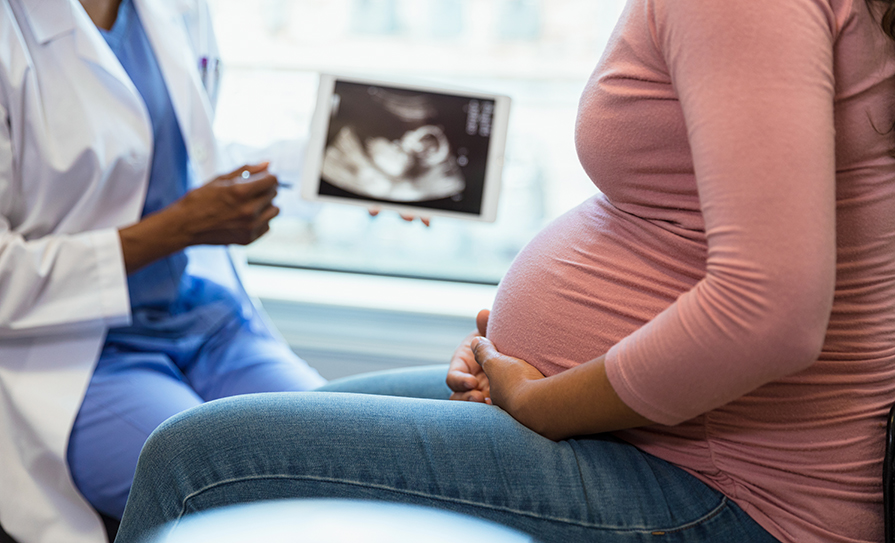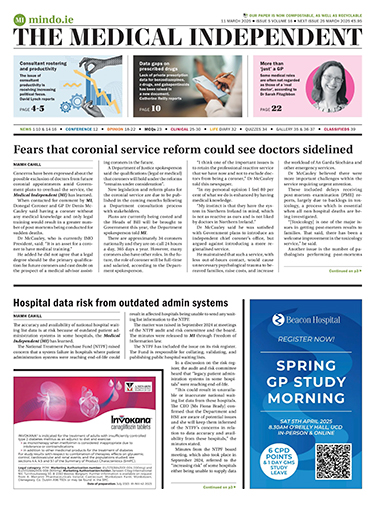Documents have revealed some resistance to full engagement with a HSE obstetric event support team and significant changes to the team’s original remit and modus operandi. Catherine Reilly reports
The roll-out of the HSE’s obstetric event support team (OEST) was strongly resisted by the Dublin maternity hospitals during 2022, according to documents released by the HSE under Freedom of Information law.
The OEST was established in August 2021. It is a “support service” for hospitals following serious adverse events in obstetrics and aims to yield learning for national response, according to the HSE.
“By engaging with the sites immediately following the occurrence of an adverse event the OEST can offer another set of eyes and make suggestions on areas of focus for the review; this offers an assurance of transparency to the family as well as a focused incident review report from the hospital,” outlines the HSE. “Additionally, by engagement with the sites the OEST can offer peer support and counsel to our colleagues on the frontline.”
The OEST does not become directly involved in reviews of adverse incidents, which should be managed in line with the HSE’s Incident Management Framework.
The Minister for Health Stephen Donnelly has described the OEST as providing “objective oversight over a specified list of obstetric clinical incidents” and ensuring all learning can be actioned through national engagement with relevant stakeholders.
However, RCSI Hospital Group, the parent Group for the Rotunda, is declining access to the OEST, while a “compromise” solution has been implemented for the National Maternity Hospital (NMH) and Coombe Women and Infants University Hospital.
The three voluntary maternity hospitals receive funding from the HSE under service level agreements (SLAs). Internal HSE records show that Chief Clinical Officer Dr Colm Henry posited the option of amending the SLAs to require cooperation with the OEST.
The OEST’s original remit encompassed four serious adverse events: Maternal death, intrapartum foetal death, early neonatal death, and babies requiring therapeutic hypothermia (TH) (the latter three categories apply to term babies with no life-limiting conditions). However, in early December 2022, the OEST Clinical Lead Dr Peter McKenna informed Dr Henry that maternal death had been removed from the OEST remit due to a replication of reporting requirements on hospitals.
NWIHP
The OEST sits within the HSE’s National Women and Infants Health Programme (NWIHP). The NWIHP was established in January 2017 to develop and strengthen delivery of maternity, gynaecology, and neonatal services nationally. Development funding for services is routed through the NWIHP, which has a pivotal role in supporting implementation of the national maternity strategy.
In regard to quality and safety, a key component of the NWIHP’s work is to support best practice and standardisation. Specific areas of focus include foetal monitoring, managing obstetric emergencies, managing major obstetric haemorrhage (including post-partum haemorrhage), and neonatal resuscitation. The programme has also published a number of updated clinical practice guidelines in obstetrics and gynaecology in collaboration with the Institute of Obstetricians and Gynaecologists, RCPI.
The OEST is a strand of work that deals with the most catastrophic incidents in maternity services, which have the highest human and financial costs.
The OEST’s core personnel, who are assigned on a part-time basis, are obstetrician and former NWIHP Clinical Director Dr Peter McKenna; and the NWIHP’s National Midwifery Lead Ms Angela Dunne; and Quality and Safety Manager Ms Aideen Quigley.
Change in remit
In October 2022, an OEST steering committee was also initiated by the Chief Clinical Officer. Minutes of the committee’s first meeting on 27 October referred to the OEST dealing with four categories of adverse event. However, weeks later, the NWIHP advised the Chief Clinical Officer that the terms of the OEST had changed.
On 5 December 2022, the OEST Clinical Lead Dr McKenna informed Dr Henry that maternal death had been removed from the OEST remit. According to the OEST update report for November 2022, the “scope of the OEST has been amended and will no longer include maternal deaths”.
The report outlined: “The OEST, as a mechanism for the gathering and dissemination of learning, also has built in learning from its own operational processes and upon review it seems to be unnecessary for the OEST to be notified when hospitals are already mandated to report maternal deaths to NWIHP. This, we have reflected, creates extra work for the hospital system and goes against the ethos of the NWIHP and the OEST.”
The NWIHP’s engagement would revert to pre-OEST arrangements that were set out in national recommendations following a review into the death in 2016 of Ms Malak Thawley, according to the update.
In summary, these recommendations had stated that the NWIHP would be added to the list of entities to which maternal death was notified within 48 hours; and advise on the appropriate review approach. NWIHP must receive reviews into maternal death for its information and inclusion in aggregate analysis to identify learning to be shared nationally; and NWIHP would advise on the clinical composition of external review teams commissioned by hospitals/Hospital Groups.
In response to the change, Dr Henry stated that the inclusion of maternal deaths “though small in number were a significant part of the OEST work”. Dr Henry asked Dr McKenna, “will we maintain same learning and [learning] notices with reversion to NWIHP?”
Responding on behalf of Dr McKenna, who was on leave, Ms Quigley stated there were existing recommendations in the system that included NWIHP in the response to a maternal death. The change was “more to streamline the reporting requirements for hospitals” and the NWIHP “will be fully engaged with hospitals” in the event of a maternal death.
However, Dr Henry said the additional presentation on maternal deaths had enhanced the OEST reports, “which I have provided to the [HSE] board and the subcommittees. Would be useful to include even if through NWIHP provenance.”
Ms Quigley responded that maternal deaths would be included in the OEST reports and the NWIHP could draft reports for the board whenever required. She said the programme would continue to keep Dr Henry updated on learning notices to the system and collaborations with units following maternal death.
Implementation
In August 2021, the OEST had commenced its work in Saolta University Health Care Group, University of Limerick Hospitals, and South/South West Hospital Group, where the constituent maternity units are HSE-run.
Between August 2021 and November 2022, the OEST engaged on 29 cases. According to a document outlining learning from the first phase of the OEST, the 29 cases involved six maternal deaths, a (redacted) number of neonatal and intrapartum foetal deaths, and 19 babies with hypoxic ischaemic encephalopathy (HIE) requiring TH.
The learning report was restricted to 22 events in the perinatal categories (one event was not considered due to incomplete data). A panel of clinicians reviewed an anonymised clinical summary of these cases and identified a number of themes as important in the aetiology of the adverse outcomes. The eight themes included issues around risk stratification (many of the cases occurred in pregnancies that were low risk in the antenatal period and, in some cases, additional risk factors that occurred in labour were not considered); parity (consistent with the literature, HIE events were more common in nulliparous women, but the preceding factors may be different compared to multiparous women); and diagnosis and management of labour (most of the women were on the labour ward, or should have been on the labour ward, for a significant amount of their care).
Second phase
The second phase of the OEST was due to begin in spring last year. However, in April 2022, the Masters of the Dublin maternity hospitals (Prof Michael O’Connell of the Coombe, Prof Fergal Malone of the Rotunda, and Prof Shane Higgins of NMH) wrote to Dr McKenna after a meeting about “your OEST proposal”.
They stated that a “very detailed and exhaustive risk management and review system already exists at the three Dublin maternity hospitals”. The serious incident management forums for maternity networks in their Hospital Groups brought “an appropriate degree of independence and externality to our risk management and review system”.
The Masters wrote that it was unclear “what additional, meaningful advantage that your proposed OEST arrangement brings to our well-established, successfully functioning risk management and review systems”. They requested information in writing on the purported advantages of the OEST and advised they were prepared to meet Dr McKenna and the Chief Clinical Officer to discuss the matter following consideration of this information.
Dr Henry was kept abreast of the impasse by the NWIHP. In May 2022 he escalated the issue to the then HSE Chief Operations Officer Ms Anne O’Connor. He advised Ms O’Connor that progressing the OEST may require an amendment to the HSE’s SLAs with the hospitals.
The Masters had been informed of the OEST’s endorsement by the HSE’s executive management team, Department of Health, HSE board’s safety and quality committee, and an instruction from the HSE National Director of Acute Operations to their Group CEOs to commence the process. Dr Henry described the initiative as “complementary” to the Incident Management Framework.
He said the NWIHP had advised of a “good start” to the OEST, which had reviewed nine cases in the first six months including a (redacted) number of maternal deaths. Based on the OEST’s work, the NWIHP had issued advisory notices to the maternity networks on risks associated with maternal suicide; and the need to capture ethnicity in adverse event reviews.
In June 2022, following a meeting between the NWIHP and the Masters, the NWIHP Director Mr Kilian McGrane informed Dr Henry they had agreed to an approach that was “slightly different from the original [OEST] model”, but which achieved all the objectives. It involved OEST attendance at the Hospital Groups’ serious incident management forums for maternity services.
“We will reserve the option of an on-site meeting and it was agreed that is an issue to be discussed on a case-by-case basis,” added Mr McGrane.
In September 2022, however, the NWIHP informed Dr Henry that while the OEST had attended the Dublin Midlands Hospital Group’s forum, communication was “ongoing” regarding the RCSI Hospital Group.
The following month, Mr McGrane outlined to Dr Henry that although the “compromise” solution had been suggested by the Rotunda Master, “when we went to activate attendance at their SIMF [serious incident management forum] we were told it was a matter for the RCSI Group and the Group have now advised us that we will not be permitted to attend. We have also had no response from Ireland East despite multiple requests. Dublin Midlands have facilitated attendance.”
On 21 April last, a spokesperson for RCSI Hospital Group told the Medical Independent (MI): “RCSI Hospital Group welcomes OEST and looks forward to an opportunity to contribute to a broader discussion on their review approach and have fully cooperated with them to date on all information/review requests.” Ireland East Hospital Group has since invited the OEST to its serious incident management forum.
Data
Speaking to MI on 17 April last, NWIHP Director Mr McGrane said the overarching context for the OEST was ensuring standardisation of care across units as recommended in the national maternity strategy.
He said data from annual reports on neonatal TH treatment was a specific trigger for establishing the team. Since 2018 the TH reports have been published annually by the National Perinatal Epidemiology Centre. While not all cases of brain injury at birth are preventable, the reports have provided enhanced detail on factors preceding a requirement for TH and have prompted a greater focus on what more can be done to address avoidable harm. The TH report findings have suggested that labour and its management play an important role in the determinants of an outcome that results in neonatal encephalopathy requiring TH treatment.
The work of the national neonatal encephalopathy action group (NNEAG) has also informed the establishment of the OEST, added NWIHP Clinical Director Dr Cliona Murphy, who took up post in April 2022.
The group, which was founded in 2019, involves the NWIHP, Department of Health and State Claims Agency.
“One of the suggestions that came out of [this work] was that we would look a bit more closely at some of these incidents and… were there lessons to be learned from it in a shorter timescale than might have been done previously, and bring the learning from those incidents back to clinical areas,” commented Dr Murphy.
While not all cases in the three categories examined by OEST were preventable, “if any of them are preventable we should be doing our best to look at those [in more detail]” and ensure improved outcomes.
“The impact that any of those incidents have on a family, and on an institution and on a clinical team, is huge,” added Dr Murphy, who referenced the wider implications for a child and their family in cases of cerebral palsy.
Mr McGrane said the idea emerged of going on-site after an adverse event and talking to local teams to expedite the sharing of any potential learnings.
He said hospitals send incident reviews to the NWIHP with personal information anonymised. However, depending on the nature of the incident, it may be some time before these are received.
Mr McGrane added that the questions raised by the OEST may be “a little bit different than might be asked” within the hospital setting.
“We tend to ask questions that might [relate to] earlier in the event,” he stated. “So, if an adverse event happens as a caesarean section at 4 o’clock in the morning, done by a registrar, and it is a very complicated caesarean section and the consultant on call might get called in… a lot of the focus will be on the caesarean section. And the question we might ask is, could a decision have been made to operate earlier? Could we have intervened at a different stage?”
He said there was no link between the lack of cooperation by some hospitals and the removal of maternal death from the OEST remit. The decision arose due to “confusion” in sites about whether to notify the NWIHP or OEST, he said.
MI asked about the removal of maternal death in the context of the asserted learning benefits of the OEST.
Dr Murphy commented that hospitals must still report these incidents to the NWIHP and other entities. “That interaction is still available…. Maternal deaths are complicated so we can visit [sites], we can give advice, etc.”
The programme is very interested in any trends that may arise in maternal deaths, albeit each of these deaths is unique and very tragic, stated Dr Murphy.
Opposition
Mr McGrane confirmed there was an outstanding issue with the RCSI Hospital Group (and not the Rotunda) in respect of granting the OEST access to the maternity network’s serious incident management forum.
“There have been multiple correspondences into the Hospital Group, and to date, we haven’t found a way of getting through the impasse.”
The other sites have accepted “our bona fides… we are there to work with them in a collaborative way”.
Asked if the reluctance to engage was due to medico-legal concerns or protectiveness over governance, Mr McGrane said: “The way it is articulated is they have a very, very robust governance process in place in the RCSI [Group] and they don’t think this will add any value to it. And nobody questions the robustness of their process at all, they do have a very good one…. But I just think there is a value added, and it is difficult if not all of the sites are involved.”
On whether the existing “compromise” solution for the Coombe and NMH will restrict the learning objectives, Mr McGrane said: “I don’t think so. We did look at this very carefully, and initially we weren’t too sure would it work. But actually, it gives us pretty much everything except direct access to the individual clinicians who were involved, but there are other people who are doing that anyway [in terms of the review process].”
Dr Murphy added that the work was about identifying “themes” and sharing this learning to ensure everyone is better prepared.
The Department provided substantial funding to the OEST in 2022.
Mr McGrane indicated the NWIHP wanted to test the concept before it was embedded so it was formed through existing NWIHP personnel. The programme must assess the effectiveness of the initiative and future direction, including whether to advertise the roles.
Asked if external input may be introduced to the OEST, given the small community of obstetrics, Dr Murphy said she did not consider that this was necessary. She said clinicians were used to case analysis through M&M-type meetings, etc. “There are MDT meetings all the time in various aspects of care…. Something external to the country might seem more formal or more… difficult or impractical.”
The nature of the approach to hospitals and “tone” of the interaction is important, added Dr Murphy.
As there are wider linkages between the NWIHP and clinical sites, the relationship has generally been positive, she said.













Leave a Reply
You must be logged in to post a comment.